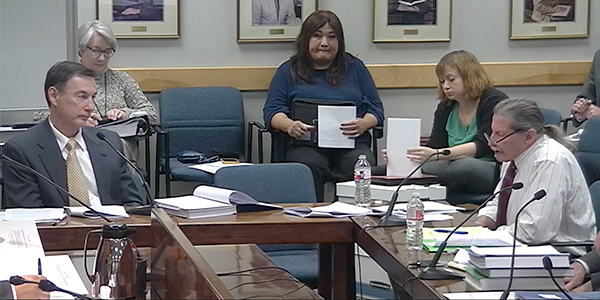By Tom Kleckner
Faced with a Feb. 9 deadline to rule on J.P. Morgan’s proposed $4.3 billion purchase of El Paso Electric, the Texas Public Utility Commission said last week it will take the matter up for consideration during its next two open meetings (49849).
Should the PUC not meet the deadline, set in motion in August when EPE and J.P. Morgan’s Infrastructure Investments Fund (IIF) and Sun Jupiter Holdings holding company filed a merger application with the commission, it would then have to file an extension.
The PUC is required to rule on acquisitions, mergers and other transactions within 180 days. It will meet twice in open session before the deadline — on Jan. 16 and 31.
“I don’t particularly want to [extend the proceeding],” PUC Chair DeAnn Walker said at the conclusion of a Jan. 7 hearing on the transaction.
To that end, Walker asked staff to spend more time with the documents and ensure “everything is tied down” and that the applicants are prepared to answer the commission’s questions during the next open meeting.
“One thing that’s certain is the commission has a very robust process to vet these types of transactions,” said attorney Lino Mendiola, representing IIF. “I can testify this process has been robust, with copious amounts of testimony and numerous discussions, emails and everything else.”
That process has a resulted in a stipulated settlement agreement between the applicants and PUC staff, the Office of Public Utility Counsel, the city of El Paso, and various consumer and labor groups. (See Parties to EPE Acquisition Reach Settlement Agreement.)
The Rate 41 Group, a coalition of school districts and other public entities, withdrew an earlier motion for continuance on Jan. 3 and indicated it wouldn’t oppose the settlement after having made “significant” progress on its issues.
“We are pleased to be a part of a very comprehensive settlement that addressed virtually every concern someone could raise,” Mendiola said.
Last Opponent
The lone holdout to the settlement is retired veterinarian Richard Bonart, who once served on El Paso’s Public Service Board. Bonart raised concerns over the stipulated agreement’s revision of the applicants’ commitment to a $100 million economic development fund, saying the loss of the words “sustainability” and “community” provided an “inferior product.” He argued that the new language would place the poorer communities around El Paso at a disadvantage.
“Those people should reap the benefits from this fund,” he said. “What you’re creating with this fund is a black box, a leap of faith. ‘Just let us do it, and we’ll take care of everything.’ I don’t think the way this is set up will guarantee … good performance.”
Bonart was given the opportunity to question the hearing’s only two witnesses: Darryl Tietjen, director of the PUC’s Rate Regulation Division, and EPE CFO Nathan Hirschi.
Tietjen reiterated earlier testimony supporting the stipulated agreement, saying the agreement “reflects an appropriate and reasonable balancing of the interests of EPE, its customers and other participants in the Texas electricity market.”
“Any changes to the stipulation could undermine its purpose, result in the withdrawal from the stipulation by signatories negatively affected by the changes, and create additional litigation and costs,” Tietjen said, reading his testimony aloud. He said he felt “absolutely confident” that El Paso ratepayers would not bear the burden funding the economic commitments, pointing to his role in annually gathering utility earnings reports.
Hirschi told Bonart that the fund, to be allocated 80-20 between El Paso and the state of New Mexico, was an “effective way to distribute the resources.”
IIF has also reached an agreement with government agencies, organizations and a lone intervenor in New Mexico. The state’s Public Regulation Commission, which also must approve EPE’s purchase, has scheduled a hearing on Jan. 16.






